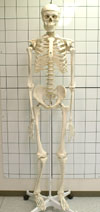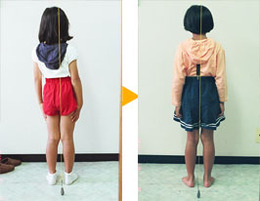HOME > Effects of Occlusion
Effects of Occlusion
Effects of Occlusion
If somebody asked, "why do we have teeth?" many people would say, "to bite, chew and eat". Of course these functions are important but is that all teeth do? No. The most important role of teeth is to "support the whole body".

Firstly, if malocclusion occurs, muscles are affected. If you chew in an inappropriate way for a long period of time, muscles such as the masseter, temporalis and the rectus capitis lateralis (located in the face or head) will experience abnormal force. Then, the neck muscles will be affected and pain will occur in the neck, arms, shoulders and back. Secondly, bone will be affected. As the jawbones are connected to the rest of the bones in the body, if they don't sit in the right position it will affect the spine and the pelvis. Not only could it cause minor ailments such as stiff shoulders, pins and needles in the arms, dizziness, ringing in the ears, backache and knee pain, it could also cause more serious complaints.
Temporomandibular Artrosis
In most hospitals, treatment using biteplanes (special plates for treating malocclusion) is very common for temporomandibular arthrosis. However, standard treatment procedures haven't been established even at university medical schools so they are not sure how many millimeters of biteplane is required for each patient. Symptoms of arthrosis are; difficulty opening and closing the mouth, pain around jaw joints and jaw joint movement not being smooth, etc. If you look at a patient's general conditions, you will notice that they often complain of stiff shoulders or backache (high and low). Therefore, we have to look at the whole body and take into account that temporomandibular arthrosis is a peripheral condition associated with spinal and pelvis ailments. It is also a perfect example of a condition that is considered to be difficult to cure because doctors practicing western medicine don't see patients' conditions as a whole.
Examples of Improvements in "General Malaise" by Adjusting Occlusion.


Photo; bad alignment caused by wearing a for a long period of time.

There are patients who are told that biteplane treatment is very safe because shaving the tooth is not required. As a result, they wear biteplanes for months or even years since their temporomandibular arthrosis or general health condition has not improved at all.
Example of improving posture by row of teeth correction

Posture has improved by improving the a row of teeth by the correction though the body had been considerably distorted, too.
Dental articulation for athletes

It's a well known fact that occlusion and the general health condition of the body are closely related, but actually how is this so? The most important role of the teeth is to support the body as a whole, as well as to chew food and speak properly. This function of overall support is significantly related to sports performance.
Occlusion affects muscles and bones considerably. If there is a problem with occlusion, muscles are affected first. Chewing in the wrong manner over an extended period, for example, puts excessive force on the muscles around the jaws. Consequently, bones and muscles in the neck that are connected to jaw muscles are affected resulting in pain extending from the neck, arms and shoulders to the back. If the jawbones and joints are in the wrong position, it affects the spine, the pelvis and eventually the whole body. A tiny micron of distortion of one tooth could affect the spine to such a degree that an athlete wouldn't be able to fully show his or her ability.

In US Major League Baseball, adjusting occlusion is actually included in players' contracts. In fact, the New York Yankees required Hideki Matsui to have dental treatment before joining them. However, in Japan the importance of occlusion and its effects in the sports field is not fully acknowledged.
The following are examples of several athletes improving their results or getting out of slumps by having dental treatment.
Yamanashi Gakuin University, which is one of the regular participants of the Hakone Ekiden - a popular annual marathon relay race in Japan, had a run of three consecutive wins from 1990 to 1992, but it had been hovering around ninth place three years in a row until last year. After giving dental treatments to their runners, they achieved much improved results, winning in the Izumo Ekiden and coming second place in the Zen Nippon Ekiden last year, and second place in the Hakone Ekiden this year (breaking the first stage record).
It is highly reasonable to conclude that the treatments affected their sports performances due to the corresponding period of the treatments and the improved race results.
A professional 5,000-meter runner had been suffering from lower back pain for 2 years and had tried almost all treatments which he could think of including orthopedic treatments and acupuncture. But, the pain did not improve and his results were 90 seconds more than his personal best. After three treatments to adjust occlusion, he lowered his time by 60 seconds and the lower back pain improved markedly.
Wearing a mouthpiece called a splint is well known as an occlusion treatment among athletes, but treating occlusion is not as simple as it looks. As occlusion varies from person to person, wearing a mouthpiece doesn't work for all athletes. Moreover, it is possible to have an affect in a negative way. Additionally, shaving one tooth by 1 micron could result in distortion of the pelvis.
Recent research has found that even materials used in dental fillings and crowns can affect flexibility of the body or sense of balance considerably.
As this technique is cutting edge, there are few dental practitioners who adjust occlusion while considering the effects it has on the body as a whole. However, having a specialist check occlusion and relating it to other health issues, can lead to more productive training and achievements as an athlete. Several years ago, it was said that "teeth are essential to the lives of entertainers" but also "teeth are essential to the lives of runners".

The following is a link to comments made by a marathon runner who got out of a long slump by having dental treatment.
![]()
![]()



